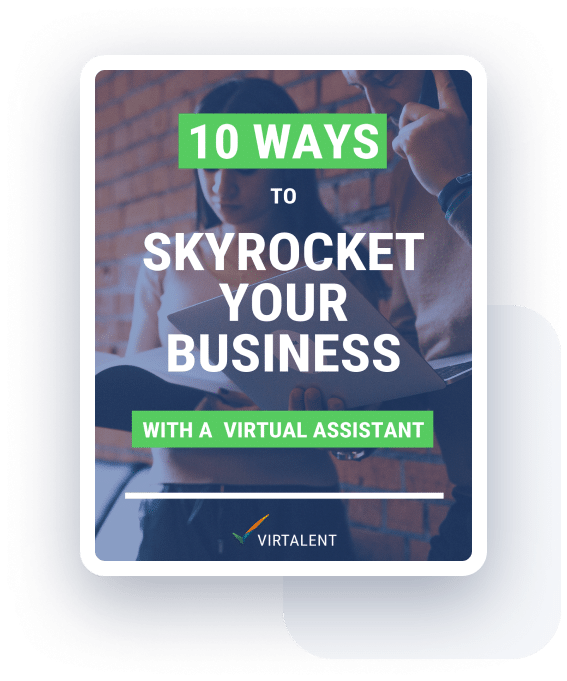Before the Virtual Assistant industry, going to work meant making that dreaded commute into the office. After eight hours at your desk, you’d log off and head home until the next day. But not anymore.
The freedom remote working has extended can also amplify our frustration with technological advances, which allow us to check our emails wherever we are. Feeling forced to finish that report on the weekend can be detrimental to our well-being and the balance we strike between life and work.
Concerns aside, many have embraced change. Technological advances have given rise to a whole host of new industries. These opportunities and careers let you work when you want, from wherever.
As our workspaces evolve in the UK, entrepreneurship continues to flourish. More people than ever are building businesses and working for themselves. The digital revolution helps those in business find high-quality and affordable support—the kind of support that wasn’t available a few years ago.
Enter the Virtual Assistant industry. An industry that continues to flourish as attitudes towards remote working shifts and cloud-based technologies continue to improve. This is where Virtalent and our team of Virtual Assistants come in.
Gone are the days when companies employed large numbers of staff, housing them in expensive offices. Today, modern businesses can virtually access the talent they need to grow. So, let’s take a closer look.
What is a Virtual Assistant?
A Virtual Assistant is a self-employed independent contractor or freelancer who works remotely. Virtual Assistants can avoid that Monday morning commute into the office by working from a home office or a co-working space.
Typically, Virtual Assistants have been hired by companies with limited resources. Perhaps these companies don't need full-time staff. Or maybe employers don’t have the space and want to avoid the time, cost and risk of recruiting new members.
Like many of the Virtual Assistants who work at Virtalent, they can provide administrative and specialist support to meet a variety of client needs. From small business entrepreneurs to larger organisations, Virtalent can support all Virtual Assistant needs you can think of.

What are the benefits?
In short, hiring a Virtual Assistant allows businesses and entrepreneurs to reclaim precious time that could be better spent elsewhere.
Chances are that as your company grows, you find yourself increasingly pushed for time. Entrepreneurs and small business owners spend too much time sweating the small stuff. This leaves little to no time for the tasks that will help you grow as a business.
Leave all your essential but low-value jobs to a Virtual Assistant. The ones that demand too much of your energy. However, with this in mind, it's worth mentioning Virtual Assistants can even help with more high-value projects too.
Not only will hiring a Virtual Assistant free up your time, but there is a large cost benefit too. By not hiring a full-time staff member, you will no longer need to provide the office essentials. Virtual Assistants come with their own equipment. Which means companies like yours continue to save on employee benefit costs, insurance, rent and utilities.
What can they actually do for you?
Whether it is a personal task or business related, Virtual Assistants can help. By letting a Virtual Assistant help with the tedious tasks, businesses can focus on what is essential. Virtual Assistants can organise calendars, inboxes, arrange travel, manage orders, respond to queries and chase those unpaid invoices for you.
As mentioned previously in addition to administrative work, many Virtual Assistants can provide support in specialised areas. For example, a Virtual Marketing Manager could manage your social media profiles, marketing strategy or write your blog posts. Perhaps you need some research done or your website updated? Virtual Assistants can help with that too. The list of possible benefits is only as short as your imagination.

The Virtual Assistant industry
The Numbers
Estimating the size of the Virtual Assistant industry is no easy task. However, Business Research Insight reported that the global market for virtual services was valued at $2054.5 million in 2021.
The proportion of business people globally who work remotely for 2.5 days or more or more has now reached over 50%. This signals an important shift. The global workforce is no longer predominantly office-based. (IWG)
Never has it been easier for entrepreneurs and small business owners to expand their teams. This, in part, is due to the continual modernisation of cloud-based technologies and the exciting and affordable opportunities they present.
How it all began
In the mid 2000’s there was a surge in popularity for online task marketplaces. This led to more and more businesses endorsing the advantages of outsourcing. This developed mutually with technologies such as Skype and the mass adoption of fast broadband that made virtual working a reality.
It was a great start for the Virtual Assistant industry. However, these marketplaces provided a quick and cheap solution, when many businesses were searching for long term and bespoke solutions which were of a higher quality.
Where we are today
Whilst the stack ‘em high, sell ‘em cheap marketplaces still exist, a new generation of providers has materialised in the Virtual Assistant industry.
Companies no longer have to sift through countless freelancers bidding to win their business. A new generation of Virtual Assistant providers, like Virtalent, eliminates this hassle and reduces risk. By combining the convenience and speed of hiring remote talent with the reliability and expertise typically associated with in-house employees.

The UK vs the world
There is also a concern with how regional Virtual Assistants are. Virtual Assistants are located all over the world but clients often prefer to work with staff based in the same country.
Working with suppliers in the same country bypasses problems associated with offshore providers. Differences between time zones, culture, language, data security, and professional insurance cover are minimised.
At one point you could contract a full-time offshore Virtual Assistant for as little as a few pounds per hour. This is quickly changing. Economies in countries like India and the Philippines are growing faster than ever. This over time illustrates an increase in wages offshore.
Outsourcing abroad for call centres and back-office functions can make sense for larger corporate companies with significant business process overheads. However, the same rarely applies to a small business looking for a single Virtual Assistant or a smaller virtual team.
The success of this intimate working relationship depends on the quality and convenience of the hiring process, as well as the desired outcome.
Where we are going
The Virtual Assistant industry shows no signs of slowing down as it continues to grow rapidly, with an estimated growth rate of 24.3% by 2030 (Grand Review Research).
At one time, it was feared that working from home was detrimental to productivity. However, research has proven the opposite. Remote workers were found to be not only more productive but also more engaged than colleagues who are in-house. In fact, 85% of virtual workers reported feeling more productive and having a better sense of wellbeing when working from home (IWG)
Virtual workers aren’t distracted by countless meetings about meetings. And without office gossip to distract them, working remotely is conducive to getting the job done. No wonder hiring a Virtual Assistant can reduce your operational costs by 78% (Best of Budgets).
The autonomy and flexibility enjoyed by remote workers has led to increased job satisfaction. For many Virtual Assistants who work with multiple clients, staying focused, organised, and efficient has become essential to meeting the diverse demands of their roles.
To sum it all up
Around the world, companies continue to ask a pivotal question: why do we have offices full of staff? Staff who spend countless hours commuting. Is this model necessary and efficient in 2025 and beyond?
Technological advancement and the ‘always-on’ mindset are vital to today’s entrepreneurs. This creates promising opportunities for the Virtual Assistant and remote outsourcing industries. Virtual Assistants offer precisely what their name implies: skilled professionals who provide support remotely.
While Virtual Assistants offer traditional services similar to those provided by a PA, they also possess a broader skill set, ranging from social media management to event planning.
It’s fair to say the industry is having more than just a moment. It’s here to stay. Intrigued? Book your free consultation now and discover how Virtalent’s Virtual Assistants can help make your life easier.







